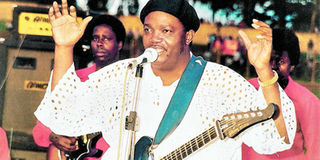Rhumba legend Franco's music still rules the roost

A name that has been firmly engraved into the hearts and memories of music lovers, young and old, is DRC’s Luambo Luanzo Makiadi Franco. PHOTO| FILE| NATION MEDIA GROUP
What you need to know:
- Franco's death marked the end of an era of a legend who had, for close to three decades, been in the front line of making immensely alluring music.
- Franco’s music was loved in DR Congo and beyond, with the burly composer, guitarist, singer and band leader enjoying frenzied adulation in East and Central Africa.
Nearly 30 years since his death in a hospital in Belgium, legendary Congolese musician, the grandmaster Franco Luambo Luanzo Makiadi's legacy lives on in the many hit songs that his TPOK Jazz churned out in more than three decades of a hugely successful musical career.
As his fans and lovers of the popular Congolese rhumba music throughout the world mark the 29th anniversary of his death in a Brussels hospital, today, in Kenya, the connoisseurs of his mercurial compositions will be reflecting on some of his timeless songs with deep social messages.
Those who understand Lingala have danced to the beats and savoured the poetry and the lyrical counsel.
Franco's death marked the end of an era of a legend who had, for close to three decades, been in the front line of making immensely alluring music.
FRANCO'S POPULARITY
Franco’s music was loved in DR Congo and beyond, with the burly composer, guitarist, singer and band leader enjoying frenzied adulation in East and Central Africa and also in southern Africa.
He was also popular in West Africa, enjoying a hero's following in Cameroon and other West African nations.
From 1956, when he formed the TPOK Jazz band alongside the equally vastly talented Vicky Longomba, Armando Brazzos, Essous, Celestian Kouka, Rossignol and Edo Nganga, Franco was a giant on the vast African musical landscape.
Later, he would bring into the band other stars, including Lutumba Simaro Massiya, who would later serve as the vice-president of the orchestra until Franco's death. Others were Kwamy Munsi, Jose Mujos Mulumba, Youlou Mabiala, Lola Checain, Michel Boyibanda, Sam Mangwana, and Josky Kiambukuta.
These stars added their great vocals to the compositions that were danced to in many African capitals and the rural areas, with adoration.
Being a member of his mighty TPOK Jazz at any one time was the pride of most of the musicians.
FAMILY VALUES
One of his most popular songs was “Matata ya Muasi na Mobali Esila te”, which was released in 1975 (loosely translated to mean the differences between husbands and wives will never end in this world).
This one dominated the airwaves in radio stations this week across many countries in the run-up to the death anniversary.
But from Friday and throughout the weekend, Kenyan FM radio stations will dedicate rhumba sessions to Franco’s music.
Typical of most of Franco’s songs, which dwelt on family values, this timeless hit remains one of the real favourites of rhumba fans across the world.
With the current upsurge in domestic violence and an increase in crimes of passion, the song “Matata ya Mwasi na Mobali Esila te” is an apt reminder and sound advice to those going through tribulations in their love lives.
Other songs that touched on family values include “Lisolo ya Adamo na Nzambe” (dialogue between Adam and God), “Mbanda Akoti Kikumbi", “Mario”, “Tokoma ba Camarade Pamba”.
There were also many love songs and, at times, some with political undertones in his expansive discography.
Franco, according to many of the musicians who performed with him, had carved a niche for himself in composing songs that touched on domestic matters, especially those relating to husbands and wives.
Also to couples who are either dating or living separately, there was a long list of songs full of advice.
Speaking to the Daily Nation on the phone on Thursday, London-based veteran guitarist Mose Sengo Fan Fan, of the Papa Lolo and Dje Melasi hit songs fame, said he will always feel honoured to have performed with Franco and recorded some of the hit songs with him.
“Every year as we celebrate the life and times of Franco, I also cherish the times I performed with the group as it was an eye-opener for me on entertainment and the launch of my long career," he said.
Mose, who joined TPOK Jazz in 1968 and left in 1973, is reputed to be among the few solo guitarists who were able to play Franco's uniquely distinctive guitar style.
The other soloist, who was able to occasionally stand in for Franco was Thierry Mantuika Kobi. He joined TPOK soon after Mose left in 1973.





